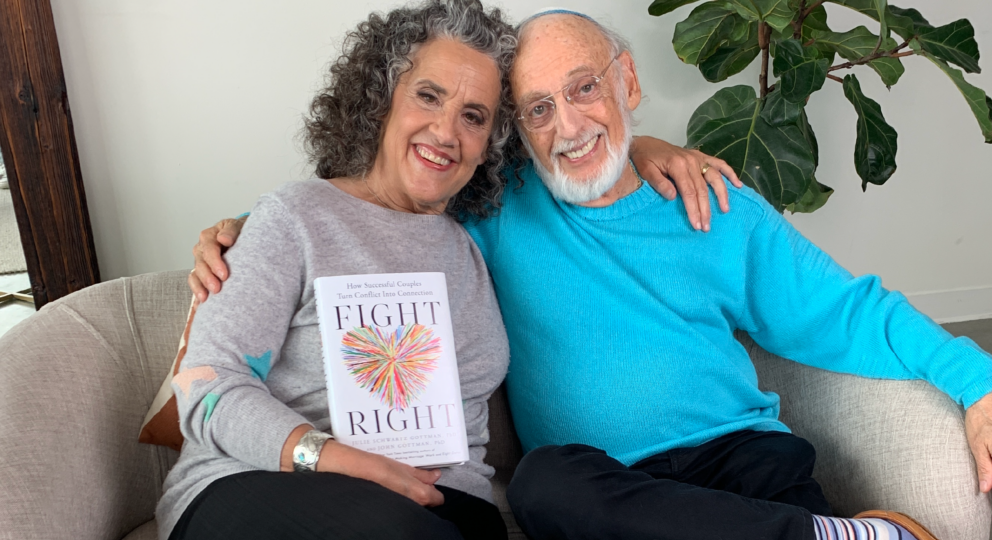Conflict isn’t the end.
It might be the beginning
Conflict isn’t the end.
It might be the beginning
You don’t need to have it all figured out. Just a willingness to try.
Just Imagine...

- Feeling less polarized, from your partner during conflict, de-escalating the fight into deep bonding right in the heat of the moment.
- Knowing when to take a break, and how to calm down. Uncovering what lies beneath the smallest fights that seem on the surface to be about “nothing”.
- Escaping the win-lose mentality, around fighting – and getting to the new mindset of understanding each other more deeply.
- Learning to repair, when something careless was said.
- Adding a bit of humor and affection, even the most heated moments with a touch of humor or affection, creating a space for connection amidst the chaos.
Did you know…
Conflict Isn’t Always a Sign Something’s Wrong. Sometimes, It’s a Sign You Care.
FREE Download | What Are You Really Fighting About?
Download an exercise designed to help you learn how to use conflict to communicate better rather than arguing endlessly.
Sign up for Love Notes and Get the FREE Gottman worksheet, What are You Really Fighting About.


The 5 dating tips helped me find the love of my life. Thank you Gottman!!
Review from Lisa

We have not been connecting well and this program has prompted deeper discussion and connection.I honestly think this program saved our marriage!
Review from Jesse B.

Working with a Gottman Therapist has transformed me as a person. For the first time ever, I feel ready for a partner.
Review from Gemma

3 months after joining Lessons for Love I found my girlfriend. I still use my learned knowledge every day.
Review from Mark

It has helped us better understand communication; it validated my feelings of not being alone such as 69% of couples had the same problems when they came back 2 years later
Review from Catriona H.

We communicate better and are more intentional with each other. Very helpful!
Review from Lindsay D.
The Single Best Way to Solve Your Problems

All About Conflict Bundle
$298.00 Original price was: $298.00.$149.00Current price is: $149.00.
In “Dealing with Conflict” Drs. John and Julie Gottman guide you through a series of exercises, concepts, and communication skills that can truly change your conflict conversations. With these new skills, going from arguing to understanding is possible. Conflict is inevitable, combat is optional.
$250.00 Original price was: $250.00.$189.00Current price is: $189.00.
$149.00 Original price was: $149.00.$99.00Current price is: $99.00.
- How to process even the most difficult arguments and heal from them together.
- What to do when you are feeling overwhelmed and overloaded, what we call “Flooding”.
- What happens in your body when you are in conflict.
- How to calm yourself down, in or out of conflict.
- The importance of “repair attempts,” or ways to get the conversation back on track, plus how to notice and make them
$149.00 Original price was: $149.00.$99.00Current price is: $99.00.
- Why you keep fighting about the same things, and how to get “unstuck.”
- How to address recurring issues within your relationship.
- How to approach conflict conversations gently, in a way that addresses specific issues.
- How to identify what your feelings and experiences are around issues that are causing conflict, and how to gently bring them up with your partner.
- How to understand your partner’s side of an issue, and how to get your partner to understand where you’re coming from.
- How to examine the individual values, ideas, and beliefs that influence how you and your partner engage with the world around you.
- More about your own emotions.
Frequently Asked Questions
Do you want more insight in your relationship?
Why do we keep having the same arguments?
If you and your partner keep fighting about the same issues, you may be stuck in gridlock – a common result of perpetual problems. Every couple faces both solvable and perpetual problems. Solvable ones are situational; perpetual ones stem from deeper differences in personality or values. Many conflicts fall into the perpetual category and can’t be “fixed”, but they can be managed. Gridlock happens when these issues leave you feeling stuck. The goal isn’t to solve them, but to understand and move forward with care and respect.
You can learn more about working through perpetual problems with the Gottman Relationship Adviser, or spot-check with the Dealing with Conflict Coach program.
Why are we growing apart instead of growing together?
Recognizing your emotions and stating a positive need is a powerful way to build connection. When you’re overwhelmed, it’s easy to lash out or shut down – but that usually leaves everyone feeling worse. Instead, pause and breathe, scan your body for tension, and ask yourself: What am I really feeling? Anxious? Drained? Unseen? Then, express a positive need. For example, instead of: “Stop bothering me,” try: “I need a few quiet minutes to recharge.” This small shift -naming your emotion and asking for what you need – can turn frustration into connection.
The Gottman Relationship Adviser can identify what you need help with in your relationship.
You can also learn clear strategies to identify and express your needs in the Feeling Seen and Heard Coach program.
What steps can we take to keep our physical connection alive and fulfilling?
Over fifty years of relationship research has shown that couples can have happy, healthy, and successful relationships if they turn towards each other, build trust and friendship, repair during and after arguments, accept each other’s influence, and focus on understanding each other over winning.
Can trust be rebuilt after it's been broken?
According to Gottman research, a healthy, satisfying sex life starts with emotional and physical safety, along with a strong sense of friendship and closeness. Without these foundations, intimacy can feel distant or unfulfilling.
How can we find more quality time for each other despite our busy schedules?
Gottman research shows that one of the greatest predictors of your relationship’s success is your ability to turn towards each other. Healthy couples constantly make and turn towards bids—the verbal or non-verbal attempts a person makes to connect with their partner. When bids are ignored or rejected, partners are more inclined to criticize each other and become frustrated.
Get a full analysis of your relationship including how you’re doing on turning towards bids with the Gottman Relationship Adviser.
Gottman Relationship Couples Blog
Read all about building lasting, healthy relationships in the dating and premarital section of the Gottman Relationship Blog.
Even Healthy Couples Fight — the Difference Is How
TED from Julie and John Gottman
Conflict is a normal, healthy part of any relationship. In fact, it’s often through disagreements that couples learn more about each other’s needs, fears, and dreams.
The real problem isn’t the arguments, it’s when those arguments turn toxic, hurtful, or cause resentment.
- Trusted by over 1,000,000 couples worldwide
- Based on 50+ years of relationship research





